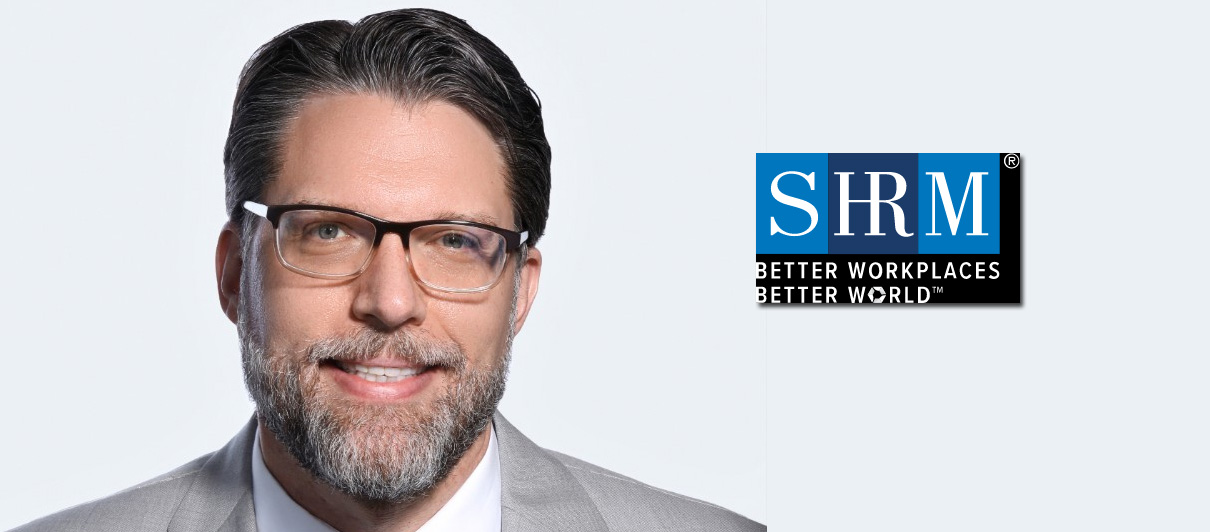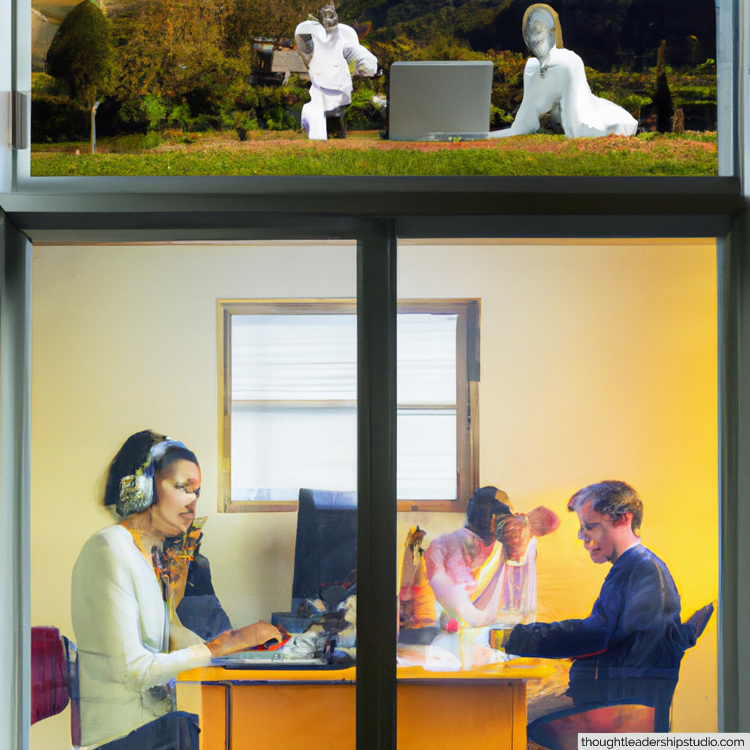Thought Leadership Studio Podcast Episodes:
Interview with Mark Smith, Ph.D. of SHRM
Episode 28 - Interview with Director of HR Thought Leadership for the Society of Human Resource Management - On working at home, the thought leadership role in an organization, creativity in the workplace, and accelerated learning through VR.

#creativity, #hr, #innovation, #interviews, #leadership, #marketresearch, #mentaltraining, #strategicthoughtleadership, #thoughtleadership, #thoughtleadershipexamples
Or Click here to listen or subscribe on appWhat this episode will do for you
- Learn how Thought Leadership can define a functional role within an organization.
- Gain insight into human performance within organizations from the perspective of SHRM's research.
- Explore the opposing perspectives on the Work-At-Home issue.
- Uncover possibilities for using VR for accelerated learning.
Mark Smith, Ph.D.
Mark Smith, Ph.D. is the Director of HR Thought Leadership for SHRM (the Society of Human Resource Management). SHRM has over 300,000 HR and business leaders as members, impacting 115 million+ employees worldwide. There are over 100K SHRM certified professionals who are transforming the workplace.
Mark holds M.A. and Ph.D. degrees in Industrial-Organizational Psychology from the University of South Florida. He has presented numerous papers and symposia at numerous professional meetings as well as authoring multiple professional publications.
 Mark was involved in R&D for the recently released report:
Mark was involved in R&D for the recently released report:
This new project from SHRM focuses on the key drivers of employee turnover. The two project reports focus on one key question: how organizations can improve their employee experience and increase retention without spending more money?
Curated Transcript of Interview with Mark Smith, Ph.D..
The transcript is lightly edited for clarity and is a partial transcript- the full interview is on audio. Click here to listen.
Chris McNeil: I'm Chris McNeil, host of Thought Leadership Studio, and I'm sitting here with Dr. Mark Smith, who's the director of HR thought leadership for SHRM, otherwise known as the society for Human Resource Management. And Dr. Smith is a respected practitioner for I-O psychology with over 20 years of experience in HR research and consulting.
 His primary areas of expertise involves strategic research approach in test development and validation, individual assessment and management development. And throughout his career, he is worked with all levels of employees. He joined SHRM in 2018 after spending most of his career in consulting roles. At SHRM, he spent three years as director of exam development for certification. But, of more special interest to you, the listener might be that he more recently became the Director of HR Thought Leadership, which is a very interesting title. So, welcome, Mark.
His primary areas of expertise involves strategic research approach in test development and validation, individual assessment and management development. And throughout his career, he is worked with all levels of employees. He joined SHRM in 2018 after spending most of his career in consulting roles. At SHRM, he spent three years as director of exam development for certification. But, of more special interest to you, the listener might be that he more recently became the Director of HR Thought Leadership, which is a very interesting title. So, welcome, Mark.
Mark Smith, Ph.D.: Thanks for having me, Chris. I'm looking forward to our conversation.
Thought Leadership as a Formal Role in an Organization
Chris McNeil: So tell us - what does this mean to be the Director of HR Thought Leadership?
Mark Smith, Ph.D.:Yeah, so when I got this role - I was put into this role a little more than a year ago - that was really my first question. I'm like, it sounds like an interesting title. I really don't know what this involves.
And so the first thing I did is I went to Google and, and, you know, asked the Google machine, okay, what is thought leadership? And, and came with, oh, okay, well that sounds interesting. You know, this, this is something I maybe I like to do.
And at SHRM, the thought leadership role that I have is located on a research team. And so in the, in the SHRM Research Institute, it's located in a little different area than thought leadership is in some other organizations.
Chris McNeil: Interesting. And what does it mean to be a successful thought leader?
Mark Smith, Ph.D.: Right. And the way that you ask that question is interesting. I think of myself as the Director of Thought Leadership - whether I am a thought leader myself, it sort of comes and goes with with the day. So I'm never even even sure about that. I do think that I'm at least starting to do some effective thought leadership.
And so at SHRM as I said, thought leadership is located on the research team, and so we'll always have a research component to it. Usually it's going to be some large scale surveys, but there may be some, some other pieces to it as well. So, so we're gathering some objective information, some types of data, maybe maybe adding to it some financial information or other economic, pieces of data and then reporting on it.
But it can't stop with, "Oh, I did an interesting piece of research and I documented it, and then I moved on to the next thing." That may be useful in some circumstances, but that's not really thought leadership. The thought leadership comes on the tail end of that. And it's, "Okay, so why should I care about it?"
And, more importantly, what should I do about it? And you know what, so usually with SHRM, we're talking to or about HR professionals. And so therefore, as a result of the research project that I did, what should the HR professional take away? What should the HR professional do as a result? And, and we really need to be clear and have that piece on the end of our research. Otherwise, it's just not that useful.
Chris McNeil: So, putting on my hat as listener advocate to regurgitate a little bit of that and make sure we're understanding. Being in thought leadership, and ... oh, by the way, I like how you said, "I'm not sure if I'm always a thought leader. "I think we always all wondered that, because isn't it better to focus on the act of thought leadership rather than the label of being a thought leader anyways... Are we having an impact?
Mark Smith, Ph.D.: Right.
Chris McNeil: But what I'm understanding is that at SHRM, you're on the cutting edge of learning about human resources, of doing studies that can have a positive impact on everybody in human resources and really through them, all of us who are employees, and then not only discovering something helpful. And my understanding is when you do research, sometimes you learn something surprising. Otherwise, why do research? We already know it all otherwise, and that can be empowering and that can make a positive difference. So then you have to change minds. And then you're dealing with entrenched belief systems sometimes.
Mark Smith, Ph.D.: Right.
Chris McNeil: ... That aren't up to speed with what we've now learned. How ow do you change minds in that case? What, what tools do you use? What strategies, what view of a system or program or method of actually having an impact on your audience?
Mark Smith, Ph.D.: Yeah. Well, as I say, for us it's going to start with the research. And you know, when you go into the research, as you said, you don't know what you're going to find. And so, I know for me, when we talk about lining up projects, you know, months in advance before we actually complete them, and our marketers really want to know, "Okay, well, what are you gonna say?" And, well, "Hold on there. We don't know what we're going to find."
First we find, and then we determine, you know, what's the best way to use it. And that also lines up with, with my background. So as an organizational psychologist, you know, trained in research, that that's really where I'm most comfortable starting. And, we can, we can go back as an example to some research that I did earlier in the year on remote work.
And, that's an interesting place for me to start because I recognize this is a big issue. And of course, it's a big issue whenever you turn on the news or talk to people. Invariably you're gonna talk to some extent about where somebody's working. I've always liked working in the office and you know, if you ask me where I prefer to be, well, as long as it's a commutes short enough and I have a reasonable office, you know, in my work location, I would rather get in the car and travel 20 minutes or whatever and be in my office away from home.
But that's not the case with a lot of people. And, and we did some research earlier this year( in which) we used a fairly advanced research technique to compare kind of job profiles.
And if you have one job that's an in-office job with a 30 minute commute, and you have another job that's a fully remote job, and you ask questions to people about what is comparable, what would you prefer? Most people will prefer that that remote job, in fact, if you're going to adjust salaries to, to get some balance into about the same number of people are interested in the remote versus the in person job, you're gonna have to pay the in-person role 20% higher.
And so for our, our research that the average salary was $60,000 in our, in our big 1500 person sample. So that equated to over $12,000 in difference in salary that you'd have to pay to get as many people interested in the in person job versus that remote job. But again, that, that wouldn't be my preference. I would look at them about equally with a 30 minute commute. If it's a 15 minute commute, I think I'd just rather be in the office, but that's just me. That's not everybody.
Chris McNeil:
Mark Smith, Ph.D.: Exactly.
Belief Systems About Working at Home - The "Suckers" and the "Slackers"
 Chris McNeil: It's interesting to me - I work with some HR people as a consultant and coach in thought leadership - the issue that come up. And on issues that comes up is in (leadership) butting heads against some old belief systems having to do with the trust of leaders for the people.
Chris McNeil: It's interesting to me - I work with some HR people as a consultant and coach in thought leadership - the issue that come up. And on issues that comes up is in (leadership) butting heads against some old belief systems having to do with the trust of leaders for the people.
Mark Smith, Ph.D.: Right.
Chris McNeil: ... And if we let people work at home, they're just going to hang out, watch TV, eat Doritos, and reach over and tap the space bar their computer every 20 minutes to record their activity, which is not really perhaps the most empowering belief in general.
And you're bringing up data that makes a financial case. You know, that should persuade any leader unless they have such an entrenched belief system that they're holding onto that, you know, makes them fearful of, of letting go to that level. How do you make the case in those situations?
Mark Smith, Ph.D.: Well, right. So this, this actually goes back to something else that I did a bit of research on and, and wrote an article on, which, which I refer to as the suckers versus the slackers. So the remote workers look at the in office workers and people who are forced to travel every day, you know, commute back in the office, they're suckers. They're wasting their time. I don't know why they're doing it. These suckers are taken advantage of by their company.
On the other hand, the people who who work in the office, including most leaders, look at the remote workers as the slackers. You know, they're waking up late, they just roll out of bed. They're probably not even brushing their hair. And then they're, they're just not working that hard. And so again, I have some data to support this, but, but really this notion of the remote workers look at the in-office workers as suckers and the in-office workers look at the remote workers as slackers.
Chris McNeil: Yeah. And this case, it seems like both are partially wrong, and both may be partially right. And that's a belief system, you know?
Mark Smith, Ph.D.: Oh, yeah. It really is. Right.
Chris McNeil: And that's what we run up against when we're practicing thought leadership: how to change these things now. And of course, having clear data.
So what have you discovered about the "suckers" and the "slackers"? Is it, are they really slackers? What, how do people really perform when they're working remotely? Are they just as motivated or more motivated or less, what's their productivity like?
Mark Smith, Ph.D.: Well, one, people just like working at home. And so they're definitely more engaged. And so that is something that we've found, but also other research researchers have found: Generally when you're looking at, at productivity, you'll find that at home workers are at least as productive as the in-office workers.
And I think largely that comes from they are, and probably because they can, but they are spending more time working. They don't have that commute. They don't have that time to get ready. So, you know, depending on where you are, by working remotely, you might have bought yourself like two more hours in a day, which is a huge amount of time.
And, and some of that these employees are spending working more hours from home. So that, I think that's generally what we find, but of course, that doesn't mean that every individual is going to be, you know, a good worker from home. Some may be slacking off, I don't know.
Chris McNeil: Yeah. It seems like the ones that would slack off would probably find a way to slack off (at the office) to some degree as well
Mark Smith, Ph.D.: Exactly.
Chris McNeil: That's a separate issue. So maybe the slacker syndrome is independent of location to some degree, it just might make it a little bit easier to get away with for a little while.
And I wonder how much it depends on the job. You know, if somebody's driving to work and all they do is log in the computer and deal with people in other locations on their computers, it seems to make exactly zero sense (to drive to the office). But of course, there's jobs where there's collaboration on evolving ideas and product development and evolving service ideas as a team. Right. What do you think about those situations?
 Mark Smith, Ph.D.: You know, I've been able to look at that to some extent as well. And, and so this was some data from earlier this year and, and we asked a number of questions of non HR folks, just US workers. Some of them were working from home, and some of them were working in the office and asking questions about relationships with their coworkers and understanding of the organization culture.
Mark Smith, Ph.D.: You know, I've been able to look at that to some extent as well. And, and so this was some data from earlier this year and, and we asked a number of questions of non HR folks, just US workers. Some of them were working from home, and some of them were working in the office and asking questions about relationships with their coworkers and understanding of the organization culture.
And generally the results are the same for working from home and working in the office.
And I would've expected that, you know, again, the relationships with the coworkers, um, the, the relationship with your supervisor, the understanding of the, the organization's culture, I would've thought that that would've been better for in the office workers. But that's not what we found for, for some people. I think there's still a bit of a newness of working remotely.
And no matter what question I asked them, I think they were going to respond positively. So we'll have to see how this all settles down. I mean, you have to imagine that if you're in the office and you see people casually getting coffee or whatever, and you're just having small talk that that will help develop some relationships.
Whether those relationships are important or not is probably a different question, but being in the office it around other people, it just seems like you're naturally going to have more relationships, even if they're not deep relationships, you'll almost undoubtedly have more people that you know.
Do We Need Teams to Come Together to Generate Creative Solutions?
Chris McNeil: Well, that brings up a couple ways of looking at it. And one thing that comes to mind for me is I was surprised a bit to see some research - and I can't point to it, but I'm going to try to find a link to it to put it in the blog post that accompanies this podcast - that creativity happens better when people have creative ideas on their own, but then bring them to evolve to a team as opposed to generate them in a team brainstorming atmosphere.
Mark Smith, Ph.D.: Right.
Chris McNeil: That kind of flies in the face of a lot of brainstorming meetings that I've been a part of and seen in past roles in my life.
Mark Smith, Ph.D.: Yeah, forced creativity doesn't work very well, I've always found,
Chris McNeil: Like "planned spontaneity?"
Mark Smith, Ph.D.: You run across the, the interesting idea when you're, when you're not expecting it, and all of a sudden it sort of pops into your head. And that, that's what I always found about team brainstorming. You'll get a bunch of ideas written down, but that's probably not anything really creative.
Chris McNeil: Yes. It seems like the, the team might be better suited to troubleshoot and evolve ideas as opposed to come up with the creative side.
Mark Smith, Ph.D.: I think so.
Chris McNeil: Which brings up maybe the, possibly if it's useful to have everybody in one room for that, the hybrid work for these situations where is, I don't know of many roles where that's going to happen every single day.
Teams in Virtual Reality
Mark Smith, Ph.D.: Right. And then, that gets into something else where I've been investigating. I, as the head of thought leadership here, get asked about the future of work and you know, that that's a pretty amorphous kind of thing.
And there are lots of futurists and other folks really speculating about what this means. And so started dabbling into, okay, what might a meta world, you know, kind of virtual reality look like? And I've been talking to, to some people who, who run their companies in this virtual world, and, they're really making the case that it can get closer to that in-person type of interaction.
And it may be useful for the things like, you know, the group discussions and coming up with the ideas that it really feels like you need to be in person to do some of those. But, they were making a case that you can start doing it when, when you get those virtual reality headsets on, and you get into this virtual world where you're not physically by each other, but it certainly feels to them like you're by each other.
Virtual Reality for Accelerated Learning
Chris McNeil: I've been fascinated by possibilities that I've not seen in a lot of discussion in the media about - the use of virtual reality for something that may have some impact on human resources in some areas is expansion of human performance.
 I think about my past life as an athlete, my current part-time life as a musician, and could virtual reality be used to facilitate visualization of enhanced performance?
I think about my past life as an athlete, my current part-time life as a musician, and could virtual reality be used to facilitate visualization of enhanced performance?
Like the peak performance salesperson in a company going through the stages of building rapport and asking the right questions and focusing on the prospect's future, and making a sale emergently based on creating a really keen buying environment full of rapport, and then see an image of another version of themselves superimposed on that, modeling the behavior, just like an athlete might mentally rehearse a particular skill for a sport.
But I haven't seen a lot of application of that, at least not discussed in the media yet.
Mark Smith, Ph.D.: No, I haven't either. When I start my discussions with these folks who have these virtual reality companies is like, explain this to me because, because I have yet to be sold. But I do understand that, that this could very well be the, the future of how we're doing things and, you know, if it can work, it can certainly make lives more convenient.
And as you bring up sports, my wife and I had been ballroom dancing for whole number of years and, you know, just sort of thinking about, well, how, how could that actually work? Could I get a coaching session from a top notch professional who's in New York and I'm in the Washington DC area and we both are, have our headsets on? You know, maybe we can, maybe, maybe that'll be sort of an exciting thing that we can look forward to in the future.
Chris McNeil: Yeah. Or even like as a guitarist zooming in and seeing the scales lit up as color dots, just the way the best guitarist in the world might see it... As a way of accelerated learning, of accelerated human performance, of tapping into untapped potential.
That's the fascinating thing for me. But it seems like, and this is be more from the outside looking in, I've not engaged that deeply in it. I'm not a gamer myself, but it seems like the VR world so far is more from gaming than it is for human performance.
Mark Smith, Ph.D.: Yeah. That, that's what it seems like. And probably that, that's where the, the revenue is at the moment. And you know, if, if the gaming world is going to be the one that, that pushes the technology and provides the dollars to have something a little bit more substantial to do some real work in than, you know, great ,
I'm glad somebody's funding it, because I'd say that may be the future. Maybe it won't be, but that may be the future. And, you know, there are companies out there that are, that are really thinking about this and pushing that envelope.
Chris McNeil: Yeah. And that's an interesting point. And that's where the revenue is. I imagine what kind of windfall profits could come from applying it to accelerated learning to shorten the cycle of training service people and sales people to the peak level, to take the best service person or sales person or creative person an organization and use it to model what they're doing that's distinctive and apply it to everybody in the organization.
It just seems like there's so much untapped potential there.
.............
The transcript is lightly edited for clarity and is a partial transcript- the full interview is on audio. Click here to listen.
***************************************
Free Stuff and Offers Mentioned in Podcast
***************************************